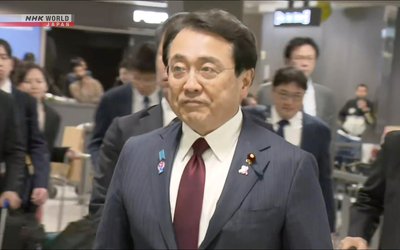More on Politics





Eminent constitutional lawyer Ganesh Raj Sharma, who edited a number of books of B.P. Koirala, once questioned Nepali Congress supremo Girija Prasad Koirala at his residence in Dhobidhara: Why shall the Nepalese remember the present set of political leaders in the next fifteen years?
Girija Prasad Koirala, who was leading Nepali Congress government at that time, avoided the answer. Sharma posed this question in the context when Nepali Congress was organizing National Reconciliation Day throughout the country remembering late B.P. Koirala in 2000.
Sharma, who has seen many ups and downs of Nepali Congress and ins and outs of Congress leaders, was convinced that Nepali Congress may have drawn the conclusion that there is no leader who stands for conviction and conscience to uphold the ideals of democracy and nationalism.
What Sharma considered a decade ago came true. Although B.P.’s brother Girija Prasad Koirala led Janandola I and II up to declaration of Nepal as a Republican, Federal and Secular state and he was the longest serving prime minister in the history of Nepal as almost 8 years in power in 15 years of politics after the restoration of democracy, he was nowhere to be remembered except for the recent peace award bestowed by Dilliraman Regmi Foundation. Seasoned politician Koirala, who was projected as a candidate for Nobel peace award, shared the peace award with much junior politician CPN-UML leader Madhav Kumar Nepal.
Even 28 years after his death, people of all ages and all spectra of Nepalese politics remember B.P. Koirala though he was in power less than 16 months and he spared his entire life in prison or in exile in India.
Whatever the circumstances he faced, elder Koirala never compromised with his conviction on National Reconciliation and he dared to speak his conviction upholding the values of liberal democracy and nationalism. However, all his colleagues including his own brother G.P. Koirala sacrificed everything to go to the power.
B.P.’s colleagues reaped the benefits of power by compromising the ideals but what they lost is identity and ideals. After joining hands with populist communists sacrificing ideals of democracy and nationalism, the same populism swept them.
“If democracy and nationalism have to be saved, we cannot afford to give in to populism. To save democracy we may at times have to take unpopular decisions and make the people accept them. Of course, that will have to be done not through autocratic methods but by convincing the people,” said B.P. Koirala in his interview to Indian journalist Bhola Chatterji.
Today, Nepali Congress stands at a place where even radical communists like UCPN-Maoist and another communist party CPN-UML condemned it for their violent act. The general strike called by Nepali Congress and violent act resorted to by its cadres on Monday surpassed that by the radical communists in destruction.
“It is shameful for us to identify as a follower of liberal Democratic Party when even communist oriented left reporters who were groomed in the ideology of violence commentary are teaching Nepali Congress its democratic ideals,” said a senior Nepali Congress leader. “I feel very strange when US educated Dr. Minendra Rijal or older generation congress leaders Sushil Koirala, Arjun Narshing K.C, Dr. Ram Sharan Mahat and son of B.P. Koirala Shashanka Koirala were justifying violence. This is the bankruptcy of the country’s largest democratic party. We have inherited this from our great republican leader Girijababu.”
As B.P. Koirala always said that Nepali Congress will lose its identity if it gave up nationalism and democratic ideals, this is what is exactly happening to it. By launching the joint agitation with communists in 1990 against the traditional force of monarchy, Nepali Congress deviated from its ideology of reconciliation. In Janandolan II, under late GP’s leadership, Nepali Congress joined hands with violent Maoists against monarchy and liberal democracy. Even founding leader of Nepali Congress Krishna Prasad Bhattarai quit the party after this decision.
Despite declaring Nepal as a federal, democratic, secular republic, nothing has substantially changed. Nepal continues to face a series of political instability one after another. In this process, many political leaders have swept in and out of power.
Along with the institution of monarchy, Nepali Congress and its ideology were swept away by destabilization. Whether saint prime minister Bhattarai or supreme leader of Janandolan I Ganesh Man Singh or supreme leader of Janandoan II, no one was spared by the radical wave. Portrayed by Indian Prime Minister Dr. Man Mohan Singh following the Janandolan II as a statesman of South Asia, late Girija Prasad Koirala’s legacy has already faded away.
As Nepali Congress is gradually proving itself as irrelevant after compromising its ideals, the popularity of its leader B.P. Koirala and his policy of national reconciliation are going high. Nepal has changed from monarchical state to republican, unitary to federalism, what has not changed is Nepal’s geographic location. This is where the policy of national conciliation fits so well.
The message B.P. sought to give homemade national reconciliation and national unity based on mutual trust and understanding was to give stability to nation and national leader. However, foreign designed consensus founded on mistrust and suspicion will only push the country into prolonged political crisis.
As Sharma said younger people don’t know even the name of leaders who led Janandolan I as Nepal’s political leaders have not left anything that they will be remembered for by the next generation of people. As Nepal is remembering B.P. Koirala and national reconciliation day, will the present day national actors rise to the occasion and take a momentous decision so they can be remembered in the next fifteen years?






